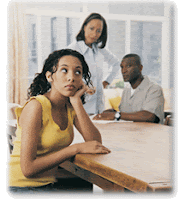
A Violent Age
Have your children ever been the victims of high school bullies? In spite of anti-violence messages and bullying videos, do you suspect your own kids may have hurt or threatened someone else? In either case, they wouldn’t be alone. Youth violence is on the rise, touching nearly every teenager in America:
80 percent of teens say they have faced high school bullies
One in three has been in a physical fight during the last year
Among teens, murder is the second-leading cause of death
Bullying Videos Can Help Stop the Violence
Experts say talking with your kids and helping them understand their feelings of anger, hurt or fear goes a long way to helping both the victims and the perpetrators of teen violence. Watching bullying videos like A Violent Age together will get that conversation started and help you both know what to say and how to listen.
Your kids will relate to the teens in this program who talk about how high school bullies affected their lives. You’ll also hear from the Hessler family, whose daughter hung out with a rough crowd and was killed during a robbery.
Bullying videos alone won’t solve the problem, but A Violent Age is a great way to take the first step. Order your copy today and get advice from experts on how to keep kids safe from high school bullies and how to get help for children who struggle from the anger, pain, fear and humiliation that goes with teen violence.
**********************************
Connect with Kids is a wealth of information for parents. I refer parents to them daily and I am always impressed with their valuable new weekly parenting articles and DVD’s. In today’s world of teenagers - parents need to be a step ahead!
Do you have a struggling teen? At risk teens? Defiant Teen? Teen Depression? Problem Teen? Difficult Teen? Teen Rage? Teen Anger? Teen Drug Use? Teen Gangs? Teen Runaways? Bipolar? ADD/ADHD? Disrespectful Teen? Out of Control Teen? Peer Pressure?
Find about more about Boarding Schools, Military Schools, Christian Boarding Schools, Residential Treatment Centers, and Therapeutic Boarding Schools.









